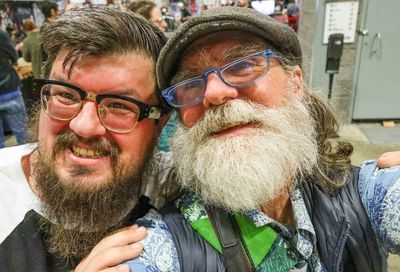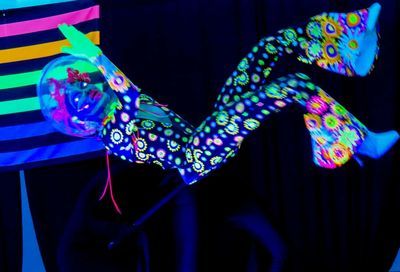Sidewalk Stories
17th Street's landmark Trio Restaurant finds itself targeted by the DCCA
Trio restaurant is a venerable Dupont Circle institution, in some ways, perhaps, even more important to the neighborhood than the namesake fountain. From its corner perch at 17th and Q streets, Trio has held on through the decline and resurrection of the neighborhood. The signature sidewalk seating has long been a habit of neighborhood denizens, a popular place to see and be seen along the busy corridor.
But this summer has seen a change: Trio’s Q Street patio has been alcohol-free for the season, and not by the restaurant’s choice. Trio now finds itself in the middle of the latest battle between businesses with liquor licenses and the neighbors who oppose them.
The story really begins back in 1950, when the Mallios family bought the restaurant and the adjacent Fox & Hounds Lounge, which is served by the same kitchen. In the 1970s, the family opened Trio Pizza as a carryout shop on the Q Street side, and later added indoor seating for the pizza place at the request of the patrons. Finally, when D.C. law changed to allow outdoor seating for restaurants, Trio added sidewalk sections for all three establishments.
 |
Current Trio owner George Mallios took over the business from his father, and his decades at the helm are reflected in the silvering of his hair. He’s made decisions that have changed the character of Trio — an electrical fire two-and-a-half years ago closed down the pizza shop. Mallios decided not to renovate and reopen the space, instead renting it out to Chef Jamie Leeds. The former pizza shop is now home to the upscale Hank’s Oyster Bar, which had its own run-in with liquor-license opponents as it prepared to open.
But although a new restaurant was in the space, Trio retained most of the patio seating area.
Under Trio’s old terms with the Alcoholic Beverage Regulation Administration (ABRA), the restaurant could serve beer and wine, but no other types of alcohol, on the Q Street patio. In November 2005, Mallios applied for a change to allow Trio to serve alcohol on that patio under the old terms granted to Trio Pizza, which could stay open until 2 a.m. during the week and 3 a.m. on weekends.
Opposition from the Dupont Circle Citizens Association (DCCA) and Advisory Neighborhood Commission 2B was instantaneous. Both groups have fought to restrict the number of liquor licenses and hours of operation in the neighborhood, and were involved in the actions against Hank’s Oyster Bar, among others.
Their views on liquor licenses in the neighborhood are given ”great weight” under ABRA’s administrative rules, and the groups have used that weight to force establishments along 17th Street to enter ”voluntary agreements” that, among other things, require establishments to close outdoor operations earlier than the law requires.
DCCA and ANC 2B want Trio to restrict hours on the Q Street patio, closing at 11 p.m. on weekdays and 12 a.m. on weekends. The groups have more than a dozen additional demands, including moving the existing railing and awning on the 17th Street patio back three feet and removing the roll-up curtains that protect patrons from the rain and cold.
Mallios has met with the two groups, but they were unable to resolve their differences. So, after much delay, they ended up before ABRA on Sept. 15. DCCA and the ANC were prepared to call seven witnesses while Mallios had a dozen. It promised to be a long session.
”There is no question we all have stories about eating at Trio,” said Douglas E. Fierberg, attorney for the groups protesting the license. ”It is a landmark in this city.”
Fierberg said Trio’s application ”represents an attempt to strip the ANC of any real authority or power in this particular locale…. [T]here is not another establishment in that neighborhood that operates until 2 or 3 [a.m. with] outdoor seating.”
ANC guidelines, dating from 1990, state that operations should be no later than 11 p.m. and 12 a.m. As for negotiations, Fierberg charged that Mallios ”keeps threatening to put in a 7-11 if we don’t buckle under.”
ABRA investigator Daniel Butler testified that over the course of five visits to the location he saw no problems of noise or disruption, or parking problems created by the restaurant. Also, the restaurant does not have a history of liquor license violations. When police have been called to the restaurant, it’s most often been to deal with aggressive panhandlers harassing outdoor patrons.
Hector Gomez was one of two local residents who testified that Trio ”is a family-friendly place that brings people of the neighborhood together, all kinds of people.”
ABRA chair Charles A. Burger then called a recess to the hearing and encouraged the parties to try to resolve their issues in the hallway. When the hearing resumed a half hour later, they had.
The new agreement calls for Trio to close the Q Street patio at 11 p.m. during the week and at 12 a.m. on weekends. It can stay open to midnight on the eve of all federal holidays and Emancipation Day, and on the nights of Halloween and the annual 17th Street High Heel Race. Seating will be minimally reduced and alcohol can be served.
The final order should be issued by ABRA within two weeks.
George Mallios was sanguine about the outcome. ”I feel all right. They had lots of issues [that they wanted] that I don’t think they could have gotten.
”The only reason why I didn’t want to close at 11 o’clock during the week is because I fear in the future they are going to say, you close at 11 on Q Street, you should close at 11 [instead of 12 a.m.] on 17th,” he continued. ”But we decided to give in and say, okay, we gave up something [on] hours and we gave up a few seats.”
Of the difficulties new businesses face in dealing with groups such as DCCA, Mallios said, ”Other people give in because they have to get open, their rent is due and [the opponents] have the leverage. They didn’t have any leverage on me, that’s the difference. [The others] couldn’t stand up to these people and I could because I have the ability to continue to operate under the old system.”
Gay activist Rick Rosendall has lived a block and a half down 17th Street for more than 20 years and was prepared to testify at the hearing in support of Trio. ”I came here because I’m tired of reflexive opposition to the businesses on 17th Street,” he said afterward.
”All of the protesters were emphasizing how much respect they have for Trio as an institution in the neighborhood, and yet they seem to constantly be protesting and giving them a hard time,” said Rosendall. ”What I’m afraid of is that people like George Mallios will get sick of that hassle and we will lose the unique neighborhood places, they will all be replaced by chains whose corporate parents have deeper pockets. That can’t be in the interest of these NIMBYs.”
Rosendall said there’s a ”level of arrogance” on the part of those fighting against the street’s signature businesses, thinking that they are ”the only ones who have a stake in the neighborhood.”
”I chose to live in the city,” he said. ”[T]he people who want to live in a quiet suburb, the city is surrounded by them.”
Support Metro Weekly’s Journalism
These are challenging times for news organizations. And yet it’s crucial we stay active and provide vital resources and information to both our local readers and the world. So won’t you please take a moment and consider supporting Metro Weekly with a membership? For as little as $5 a month, you can help ensure Metro Weekly magazine and MetroWeekly.com remain free, viable resources as we provide the best, most diverse, culturally-resonant LGBTQ coverage in both the D.C. region and around the world. Memberships come with exclusive perks and discounts, your own personal digital delivery of each week’s magazine (and an archive), access to our Member's Lounge when it launches this fall, and exclusive members-only items like Metro Weekly Membership Mugs and Tote Bags! Check out all our membership levels here and please join us today!




















